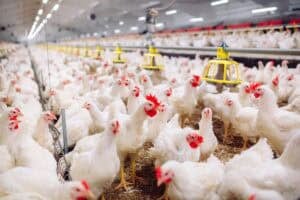Dr Maré, who chairs the Poultry Group of the SA Veterinary Association, weighs in on the risks and implications of the bird flu strains.

South Africa’s poultry industry is under siege as it grapples with two distinct bird flu strains – H5N1 and H7N6.
The latest outbreak of the highly pathogenic avian influenza (HPAI/bird flu) skyrocketed to “catastrophic numbers”.
This is according to Dr Wilhelm Maré, who chairs the Poultry Group of the South African Veterinary Association.
Bird flu update
The H5N1 strain predominantly affects wild birds in the Western Cape and KwaZulu Natal, it has fortunately not infiltrated commercial poultry farms.
However, the H7N6 strain has become a substantial cause for concern, Dr Maré said said on Sunday.
‘Catastrophic’ situation
Speaking on Radio 702, Dr Maré said the H7N6 virus was first identified on a farm in Mpumalanga. It has, since then, rapidly extended its reach to Gauteng, Free State, Limpopo, and the North West.
This particular strain is becoming increasingly problematic, creating alarm within the industry. In fact, Dr Maré describes the situation as catastrophic.
Approximately 8.5 million egg-laying birds have been affected, equating to nearly a quarter to a third of the sector.
Broiler- and layer breeders a concern
He says shortages in supermarkets are likely, especially since about 2.5 million broiler breeders have been affected by the outbreak.
The number of affected broiler breeders (responsible for chicken meat production) equates to nearly a quarter of the industry.
Meanwhile, some 200 000 layer breeders are affected. Dr. Maré said the impact on layer breeders is the most concerning.
These birds – making up approximately two-thirds of the industry – will be the most challenging to replace.
Human health risks
Dr. Maré also spoke about the potential for avian flu to jump to humans, saying it is a possibility but not a certainty.
While it is historically rare for bird flu to jump to humans, it is not impossible.
However, he said current tests indicate the H7N6 strain is highly specific to chickens and does not pose a risk to other birds or humans at this stage.
That said, the World Health Organization (WHO) said some mammals could serve as “mixing vessels” for flu viruses.
This could potentially lead to the emergence of even more harmful strains entering the populace.
Prevention better than cure
Given the severity of the current outbreak, Dr Maré said it’s crucial to adhere to general food preparation guidelines.
These include maintaining clean utensils and separating raw items from cooked items. Other food preparation safety tips include:
- Always wash your hands before and after handling raw poultry.
- Use separate cutting boards for raw and cooked foods.
- Make sure to cook poultry to the recommended safe internal temperature.
- Avoid close contact with sick or dead birds, if you encounter any.
‘Worst outbreak’ to date
Back in September, Quantum Foods said it had lost almost two million chickens this year – the equivalent of a R100 million-knock to the industry.
“The bird flu outbreak is the worst that South Africa has witnessed,” fellow producer Astral added.
“(It) has already caused short supplies of table eggs into the market, and it is expected that the supply of poultry meat into the value chain could be affected negatively in the coming months.”
Soon after, government said it was planning to fast-track the use of vaccines to fight the highly pathogenic avian influenza (HPAI).
Support Local Journalism
Add The Citizen as a Preferred Source on Google and follow us on Google News to see more of our trusted reporting in Google News and Top Stories.






